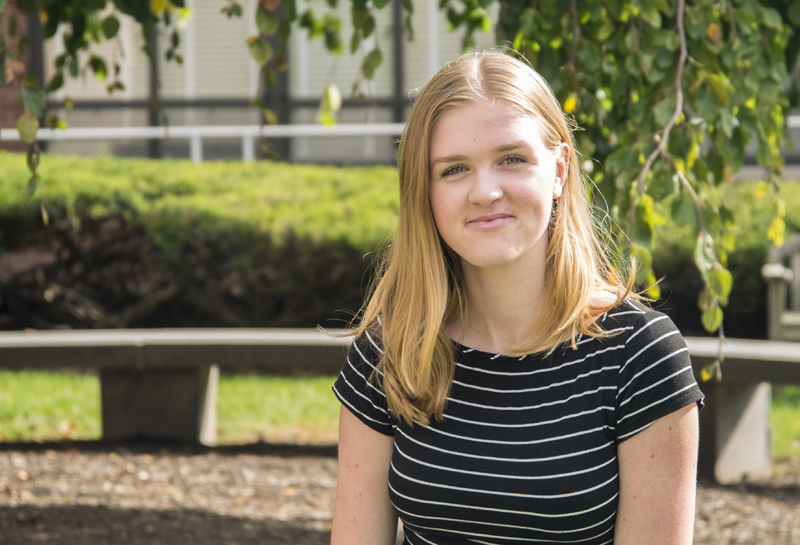Harpur student spotlight: Emma Hopkins
Senior chemistry major studies clean-energy production

Fear has never stopped Emma Hopkins from pursuing her research in nanoparticle synthesis, a field that would intimidate many 21-year-olds.
“When I tell people the classes I’m taking, they’re like: ‘Oh, OK. Those are words I don’t understand!’ And when you’re approaching something from that mindset, everything seems scary,” Hopkins said. “But when you get enough sleep every night and you eat enough, and you make sure you’re OK before you head into this type of stuff, these classes with these big, ridiculous names don’t feel as scary.”
Hopkins, of Brooklyn, N.Y., is a senior majoring in chemistry at Binghamton University. Her research focuses on clean-energy production, where oxygen is broken down to produce energy and water without producing the harmful greenhouse gases that come from oil or gas.
“The issue is the reaction is slow and it takes a platinum catalyst to do it,” Hopkins said. “Catalysts make reactions go faster, but platinum is hella expensive, so I make this tiny little thing that goes into the fuel cell (a battery) and it makes the whole thing go faster.”
It is a complicated subject, but Hopkins has made the explanation simple enough to a point that she can explain it even at parties.
“We do it trying to use cheaper metals like copper, cobalt or nickel,” Hopkins said. “If we can use cheaper metals and make it work better than commercial platinum catalysts, we can put fuel cells in cars and it will be cheaper than regular gas. The objective is to make sustainable, clean, fuel-cell energy an actual option.”
One of Hopkins biggest role models is her mother, who instilled in her an appreciation for the environment.
“Growing up, my sisters and I would raise butterflies in laundry baskets. My mom is very concerned about the butterflies,” Hopkins said with a laugh. “We had a table full of parsley plants on our deck because black swallowtail butterflies lay their eggs in parsley. Birds eat the caterpillars, so we’d bring them inside and put them in mesh laundry baskets, feed them more parsley, and when they hatched we would release them.”
This appreciation inspired her desire to do environmentally-focused science and she hopes to continue doing chemistry in this field to make an impact where she can.
In her free time, Hopkins enjoys hiking and swimming. She also knows the importance of fun and loves to dance, which is another trait that she picked up from her mother.
“My mom is a big dance-until-your-legs-hurt nut,” Hopkins said. “Whenever I go to a party and it’s great, I call my mom and tell her about it because I know how proud she would be that I danced until 3 in the morning. She taught me how fun it is to go and dance with people for as long as your legs can stand.”
Hopkins considers fun a core value in her life, along with curiosity and kindness. They are three words that describe her energetic personality.
“Curiosity encourages you to learn something for the sake of learning it, which I enjoy,” Hopkins said. “When you get into that mindset of learning things because you have to or learning things because you feel like you need to, that can start to feel really taxing.”
Knowledge and learning are also important to Hopkins. She has found that people who are empathetic and nice are the people she learns the most from. In turn, she tries to encourage kindness in herself, so that she can help other people.
These values are the driving force behind Hopkins and all she has accomplished. She was awarded Binghamton University’s undergraduate award to support research in fall 2017 and completed a prestigious research program over the summer.
The National Science Foundation Research Experiences for Undergraduates program she completed accepted only 10 students from across the nation, paid for airfare and housing and provided a $5,000 stipend.
“It’s a 10-week program where you shadow a graduate student and they teach you what they do,” Hopkins said. “Before this I thought graduate students were superheroes, and then I met them and realized they are still superheroes, but also normal.”
The Oregon-based program focused on oil-water interfaces and chemicals called surfactants that “like to hang out right there at the interface,” Hopkins explained. An interface is a surface forming a common boundary between two things.
She used large lasers to execute the diffusion, which, when applied to a real-life circumstance, can help extract oil in the case of an oil spill.
“I got the chance to be around all these things that feel intimidating when you only see them once in a while,” Hopkins said. “I was in that lab 40 hours a week, spending time around these giant instruments, and I realized they aren’t that scary.”
Hopkins plans on taking a gap-year after graduation to help discover what kind of chemistry she would like to research while obtaining her doctorate.
“I haven’t really decided whether I want to work in an academic setting, a national lab or a job-type of setting, but I see myself as a key part of a team,” Hopkins said. “Working on something that helps the environment in any way, but feeling productive — hopefully being outdoors a lot and having people around me who encourage me to be kinder and better.”
